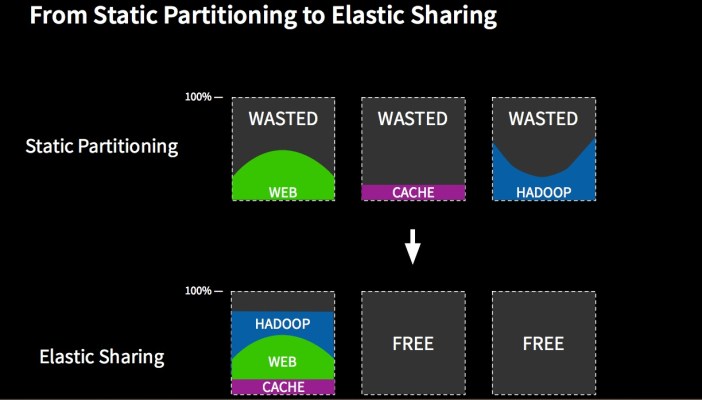Mesosphere, a Silicon Valley startup based on the open source Apache Mesos project, announced $10.5M in Series A funding today.
The funding round is led by Andreessen Horowitz with help from Data Collective and Fuel Capital. This follows seed funding a year ago of $2.25M from Andreessen Horowitz, Kleiner Perkins, Foundation Capital and SV Angel.
The company wants to change how companies manage resources on servers inside the datacenter, based on the open source Mesos project by essentially allowing you to pool the all of the computing resources in a datacenter as a single machine, thereby distributing resources in a much more efficient manner (as the graphic above illustrates).
According to Matt Trifiro, SVP at Mesosphere, this is possible because of containerization technology developed by Google. Building on Google’s concept, Mesos allows system administrators to take complex applications that run at scale and use the resources of the entire datacenter as a single unit, using containerization to isolate the processes.
As Trifiro explained, this is markedly different from virtual machines, which break a single machine into multiple smaller machines. This has allowed system administrators to run applications in a much more organized manner by using the entire machine. He said that approach worked well when applications were relatively small, but as they got bigger and more complex, one machine, no matter how many smaller machines it was sliced into, was no longer sufficient.
Cloud applications that run at scale actually required the resources of more than one machine. The single container approach lets them use whatever resources they require, but while Mesos has been in production across a number of companies including Twitter, Airbnb, eBay and Netflix, the actual implementation remained highly complex and required skilled engineers to implement.
Mesosphere co-founder, Florian Leibert, says they saw an opportunity to simplify this and started Mesosphere. Among the first products it developed is a tool called Elastic Mesos, which lets system administrators create a fully running Mesos cluster in the Amazon cloud in just three steps, simplifying what had been a highly complex process.
But Trifiro says they won’t stop there. “We are bringing that level of simplicity and management to any target platform, from on-premises/private Ubuntu, Redhat, Debian, etc. to private clouds like OpenStack to public clouds like Amazon Web Services, Google Compute Engine and Digital Ocean,” he said.
What’s more, regardless of the underlying platform, it’s fault tolerant because if one machine inside the cluster fails, so long as there are available resources, Mesosphere’s product will simply transfer it to another machine without intervention from any human personnel.
The underlying administration tools, let you add different elements such as a web server, a web cache and a Hadoop cluster. In a traditional datacenter, these tools might be spread out across multiple servers in a highly inefficient manner that wasted much of the server capacity (as illustrated in the picture above).
Mesosphere fills up the space on one server before it starts adding applications to additional server space. If a job is running that requires a certain amount of server resources, it will fill the available resource capacity on one server, rather than simply starting on the next available one.
Mesos was originally developed as a Ph.D thesis by Benjamin Hindman, et. al., at University of California at Berkley. Leibert was working at Twitter when he discovered this research and brought Hindman on board to help solve Twitter’s infamous ‘Fail Whale’ problem where when the servers were pushed beyond capacity, Twitter simply stopped working and displayed the Fail Whale graphic. Twitter open sourced much of the code, which became the Apache Mesos project.
Leibert says his company’s product works for large and small companies alike because it simplifies these highly complex activities and that allows every datacenter, regardless of size, to use its personnel and computing resources much more efficiently.
In addition to Elastic Mesos, they have other products including Marathon for large-scale orchestration, and Deimos for Docker integration.
Disclosure/Correction: We neglected to mention Crunchfund was also a seed round investor in this company.
